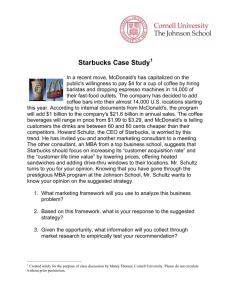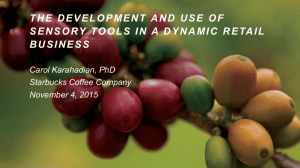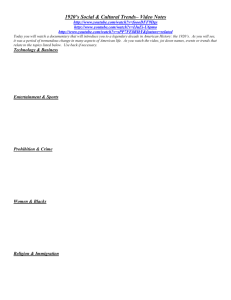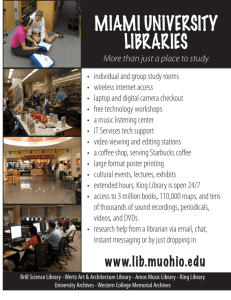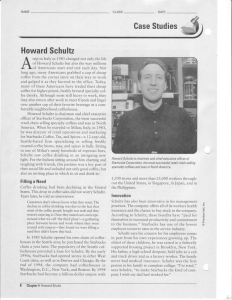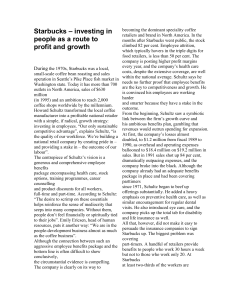document
advertisement
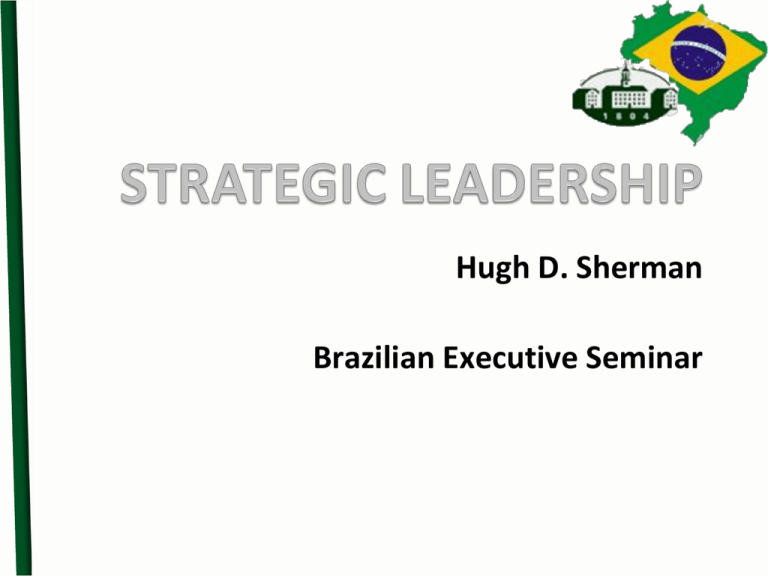
Hugh D. Sherman Brazilian Executive Seminar Distributed/Virtual Organizations Organizations whose members and resources may be geographically dispersed but function as a coherent unit though the use of information and communication technology What are your leadership Challenges? New Competitive Environment Major Trends in the Environment? 1. Shift in Economic Power Among Nations 2. Sustainability as an Opportunity 3. Others? Top Performing CEO’s in the World • Steve Jobs - Apple • Yun Jong-Yong Two in the top 50 from Brazil • Ben Steinbruch –CNS (steel 72%, spinning off mining) • Maricio Botelho – Embraer (4th largest airplane maker, regional jets) Leadership’s Focus Strategic-Positioning the organization for the future Operational – Focusing on short term results • Plans Ahead- Long View & Big Picture • Pursues Growth – Seeks ways to grow and expand capabilities • Promotes Innovation – questions status quo • Focuses on current resultsdetails of implementation • Maximizes efficiency • Maintains order – gets things done using procedures and processes Source:HBR Kaplan Kaiser2009 Approach to Leadership Forceful – Exercising influence with own intellect & energy • Takes charge – own initiative, gives direction • Declares/decides – takes a position and defends • Pushes – sets high expectations and holds people accountable Enabling – Creating conditions for other people to contribute • Empowers – gives others the latitude to do their jobs • Listens/includes-seeks input, is open to influence • Supports –shows appreciation and sensitivity HBR - Kaplan & Kaiser (2009) STRATEGIC LEADERSHIP Definition - Ability to anticipate, envision, maintain flexibility and empower others to create strategic change Long term competitiveness -Need to respond quickly & appropriately to environmental change Requires continually changing set of assumptions and accepted wisdom as to how industry operates Ireland & Hitt (1999) AME STRATEGIC LEADERSHIP TASKS • • • • • • Develop Strategic Vision Core Competence Develop Human Capital Effective Organizational Culture Balanced Control Systems Ethical Practices Creation of High Performance Organization: 1. Strategic Vision 2. Culture 3. Development of People 1. STRATEGIC VISION • Definition - a concept for a new and desirable future reality • Provides an identity, shared values • Collins & Porras study of long term performers (Book -Built to Last) Strategic Vision - Purpose • Based in Charismatic Research • Similar to mission, aim, target in that it provides direction and focus • But focus is future opportunities, represents a change in strategy • Taps people’s energy and emotion STRATEGIC VISION • Peter Senge (Fifth Discipline) -One of the most powerful forces is a shared vision. • Shared visions derive their power from a common caring. People have a desire to be connected to an important undertaking. STRATEGIC VISION EXAMPLES • General Electric • Starbucks – Howard Schultz Jeff Immelt • Took over 2001 – key changes in demographics, digital connections, emerging markets, environmental issues • New Strategy – Transform into Technology Growth Company – Selected ten industries to focus on – increased R&D and acquisitions in these areas – Heathcare, energy &water, aviation & rail, financial services – 2008-less emphasis on financial services, NBC Universal – Dec. announcement will sell NBC Universal to Comcast STRATEGIC VISION PITFALLS Need to build consensus & obtain commitment versus compliance (Gertsner – “if people do not buy the logic the change will not stick”) Takes time & patience - Not a one-shot deal British Petroleum Tony Hayward • Failure to balance competing objectives – is there is a systemic failure of safety culture and safety management • Between 2007-2010n BP cut 7500 jobs and billions of dollars in costs ($4 billion in 2009 alone) • Occupational Safety & health Administration found numerous safety hazards in the Texas refinery as well as problems in Alaska and Mexico operations • Issue seems to be chose wrong metrics to track their own efforts • Role of CEO – put in place the appropriate performance benchmarks and supporting processes that ensure the company is meeting its most basic priorities • • • http://www.youtube.com/watch?v=EAewAQfrVcc&feature=related http://www.youtube.com/watch?v=ZF64SPueNtw http://www.youtube.com/watch?v=FZAVcPuXeSU&feature=related 2. Organizational Culture • Definition: shared ideology, core values which determines the way things get done • Gertsner – “culture is isn’t just one aspect of the game – it is the game” Organizational Culture • High performing organizations create cultures around their strategic vision. • Strategic leaders must sincerely believe and continuously practice the stated values. The executives must be careful to lead by example. 3. People • No job is more important than finding & developing great leaders • “Have to have the right people on the bus..in the right seats” Collins in Good to Great • The right people can adjust to change and de • Develop other people Development of People Talented managers want: • Exciting challenges • Associated with an organization that is making a difference • Open, trusting, performance oriented culture People • Disney’s Michael Eisner “Our real product is managing talent. That is what we do here, and we never lose sight of that, because without it what do we have? • Jack Welch - my whole job is picking and providing opportunities to the right people. Starbucks – Howard Schultz • http://www.youtube.com/watch?v=TCxzjT3Hq-8 Environmental Change • Severe Recession – People reconsidering how can pay $4 for cup of coffee – price of gasoline reaching $5 gallon – Weekends were previously most busy – people staying home – had hours could not afford help – Social media – example wasting water in Britain in the making of coffee became hot point for conservationists • Increased competition – McDonald’s and Dunkin Donuts competing on price – coupons – using it to draw traffic for other items of food – Local chains of café coffee producers popping up – and people felt should by local The best organizations are those that offer us the opportunity to attain meaning and fulfillment in our work. That have a passion for making a difference. NEW STYLE OF LEADERSHIP Lead with purpose, meaning and values Build enduring relationships with people Authentic (definition: genuine, worthy of trust, reliance or belief)
